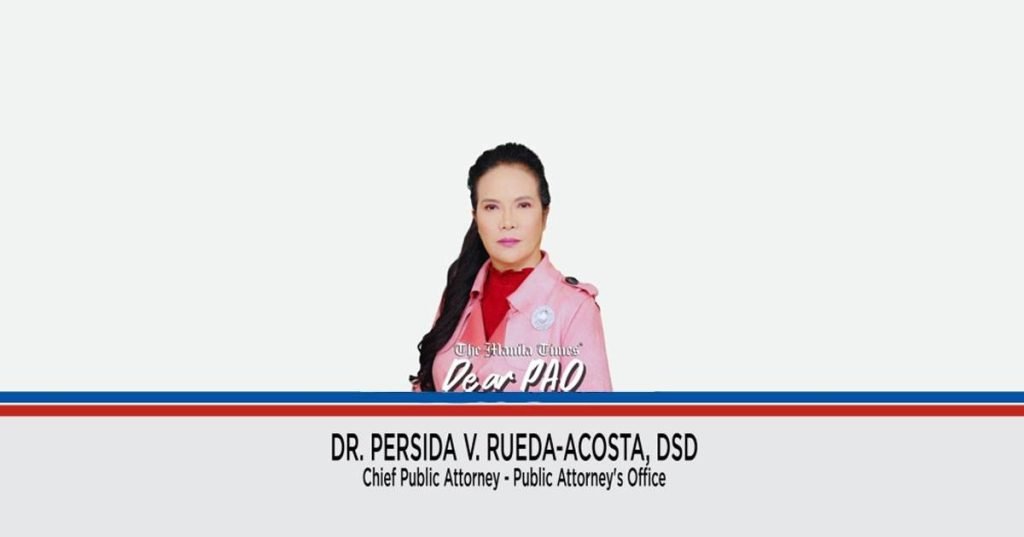
Dear PAO,
After passing the licensure examination for teachers, I secured a job as a high school teacher in a private school run by a religious organization. As a single individual, I developed an intimate relationship with my boyfriend, who is also single. In the course of our relationship, I became pregnant. After informing the school management of my status, I was suspended from work, with an agreement that I would be reinstated any time after I got married. Allegedly, a single woman who becomes pregnant indulges in the practice of premarital sexual relations, which runs contrary to the religious morality practiced by the school. Is my suspension valid?
Mylene
Dear Mylene,
In addressing issues of alleged immoral conduct, the Supreme Court follows the standards of public or secular immorality, as distinguished from religious morality. Thus, following public or secular immorality, a conduct is considered immoral when it is detrimental or dangerous to those conditions upon which the existence or progress of human society, and not because the conduct is proscribed by religious beliefs. This is the pronouncement of the Supreme Court in Leus v. St. Scholastica’s College Westgrove (2015), which was reiterated in its recent decision in the case of Bohol Wisdom School v. Mabao, GR 252124, July 23, 2024, penned by Associate Justice Ricardo Rosario, which held:
“In the eyes of the law, there is a standard of morality that binds all those who come before it, which is public and secular, not religious. It is important to make this distinction as the Court’s jurisdiction extends only to public and secular morality.
“Public and secular morality refers to conduct proscribed because they are detrimental to conditions upon which depend the existence and progress of human society. Otherwise, if government relies upon religious beliefs in formulating public policies and morals, the resulting policies and morals would require conformity to what some might regard as religious program or agenda.
“In this case, respondent was suspended for engaging in premarital sexual relations, resulting in being pregnant out of wedlock.
“The Court has previously ruled in similar cases that premarital sexual relations resulting in pregnancy out of wedlock cannot be considered disgraceful or immoral when viewed against the prevailing norms of conduct. In Leus v. St. Scholastica’s College of Westgrove, We held:
“In stark contrast to Santos, the Court does not find any circumstance in this case which would lead the Court to conclude that the petitioner committed a disgraceful or immoral conduct. It bears stressing that the petitioner and her boyfriend, at the time they conceived a child, had no legal impediment to marry. Indeed, even prior to her dismissal, the petitioner married her boyfriend, the father of her child. As the Court held in Radam, there is no law which penalizes an unmarried mother by reason of her sexual conduct or proscribes the consensual sexual activity between two unmarried persons; that neither does such situation contravene any fundamental state policy enshrined in the Constitution.
“And in Inocente v. St. Vincent Foundation for Children and Aging, Inc.;
“xxx While their actions might not have strictly conformed with the beliefs, ways, and mores of St. Vincent — which is governed largely by religious morality — or with the personal views of its officials, these actions are not prohibited under any law nor are they contrary to conduct generally accepted by society as respectable or moral.”
Applying the foregoing principles to your case, it is clear that your suspension from work based solely on non-marital sexual relations resulting in pregnancy is illegal because premarital sexual relations are not disgraceful or immoral, within the contemplation of the law. No law proscribed such conduct, neither does it contravene any state policy as enshrined in our Constitution. Even if such conduct offends the religious practices of the school, it cannot be considered a valid ground for your suspension as the State is not mandated to adopt the definition of sexual morality set by any religion, but rather the standards of public or secular immorality as defined by our laws and jurisprudence.
We hope that we were able to answer your queries. This advice is based solely on the facts you have narrated and our appreciation of the same. Our opinion may vary when other facts are changed or elaborated.
Thank you for your continued trust and support.
Editor’s note: Dear PAO is a daily column of the Public Attorney’s Office. Questions for Chief Acosta may be sent to [email protected]






